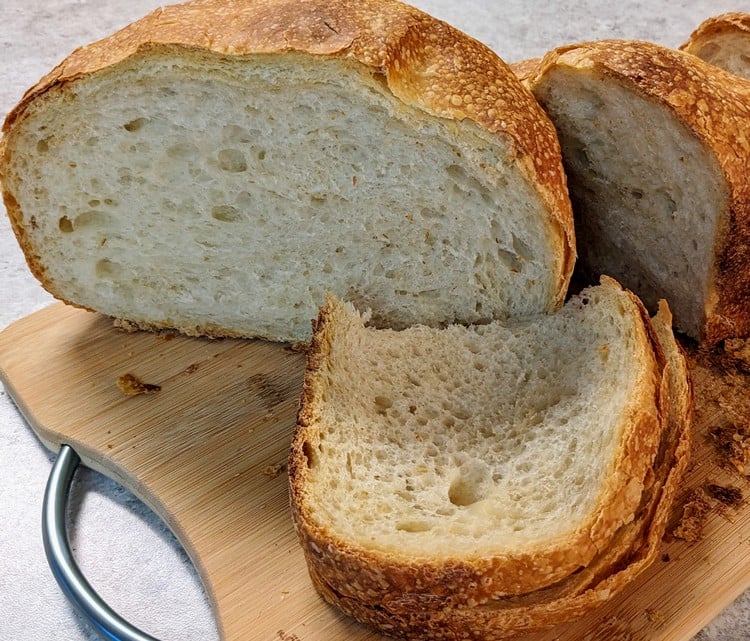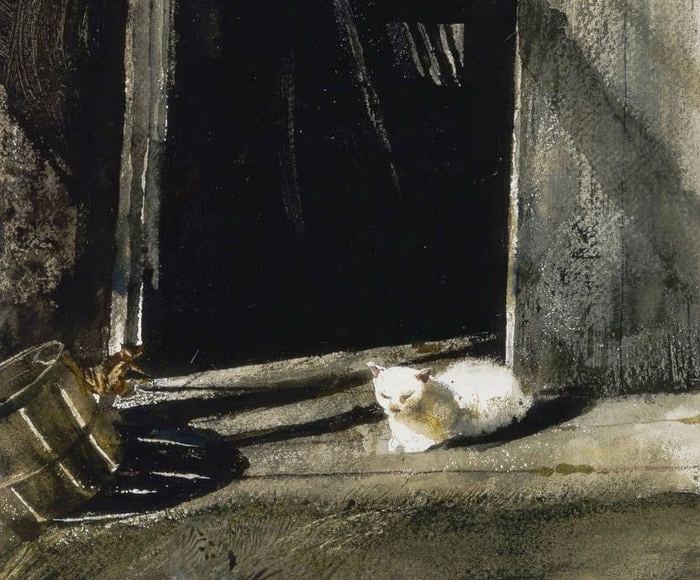Afterwords -- bread

"Give us this day our daily bread..." (Matthew 6:11)
"Jesus said to them, 'I am the bread of life; whoever comes to me shall not hunger, and whoever believes in me shall never thirst.'" (John 6:35)
September 21, 2023
Dear friends,
We are enjoying beautiful autumn weather here in Blacksburg. The mornings are crisp (in the 50s), which is great for walking and hiking. We're enjoying our late blooming flowers and evenings on the deck with the fall sounds of crickets. And we are daily enjoying freshly baked sourdough bread (above). You can almost smell it! (By the way, here are eleven reasons why you should be eating sourdough bread.) Fresh bread was placed upon the table in the tabernacle (and temple) weekly to remind the Israelites that God was their provider. Jesus included the request for daily bread among the six petitions of the Lord's prayer. And all the sustaining goodness of bread points us to the eternal life we have by coming to Jesus Christ, who is the bread of life. Every Lord's Day we pass the bread (unleavened, not sourdough) to one another in church, recognizing our life shared together in Christ.
RESTLESS... Now, why don't more people come to feast upon Christ and the life he gives? Why don't people see that knowing God, their Creator and Redeemer, would bring such great, eternal satisfaction? In his Confessions Augustine wrote about the restlessness within the heart of man before coming to God. John Calvin in The Institutes wrote about how our misery and alienation from God should drive us to seek to know who God is, that we may find in him the life and peace we long for. But generally people seek for peace through other pursuits: money, politics, romance, sex, the joy of sports, entertainment, victories, fame, approval, recognition, and many other "diversions".
PASCAL AND DIVERSIONS. Blaise Pascal (1623 – 1662) was a brilliant French mathematician, physicist, inventor, and philosopher. Around 1660, toward the end of his life (he died at 39), he was working on a manuscript, The Evidences of Religion, which was to be an apologetical defense of Christianity. He died before finishing it, and a posthumous edition of his entries (some of them just sentence fragments) were collected topically and published as Pascal's "Thoughts" (French, Pensées, pronounced "pon-SAY"). I'm currently reading this classic work.
OUR MISERY. The second section of entries is "The Misery of Man without God" (entries #60--#183). His main idea is that people should be seriously seeking God, since they know that life is short and uncertain, that sin brings misery, judgment is coming, and eternity is a long, long time. But rather, people pursue ways of not thinking about this at all. When he writes of "diversions" he is writing of all the pursuits in life which divert us from the all-important pursuit of God. Read here what Pascal had to say about that.
WHAT DRIVES YOU? After a recent discussion together, my good friend Neil Damgaard listed twenty-five things that "drive" us: "hunger, wish for power and influence, money, possessions, acceptance and affirmation, vengeance, use of my gifts and strengths, desire for calmness, needs of others, addictions, wish for advancement and forward progress, justice, challenge, avoidance of boredom, escape, need for healing and recovery, keeping a job, survival, security and safety, national pride, ethnic pride, discovery, and fear." Some of these are more commendable pursuits than others on that list. But none of these drives should replace, or divert us from, the primary purpose of knowing God. To know the one true God, and to know ourselves truly, should be the main pursuit and driving force of our life.
IN OTHER READING.
-- "We are going to a city where there will be no ruins. The gates of pearl will never come unhinged. The streets of gold will never be torn up. The walls of jasper will never fall. The great temple will never lose its opulence. The many mansions will never crumble, never burn, never be destroyed." (Tim Challies) Read "Flimsy as Stone" here.
-- "Throughout my adult life, I have met many women who saw motherhood as an obstacle to reaching something 'greater,' as if it stopped them from something... I came to an even deeper realization that motherhood is one of the woman’s missions in life, even though society tends to increasingly depreciate it." Read an "Interview: Photographer Documents 33 Women Before and After They Became a Mom."
-- “To respond to our times we must first understand our times,” Carl Trueman. Here's an excellent summary and review of Strange New World (Crossway, 2022).
-- "Computer says no." We get used to doing as we are told, not what we think is right. Read "The Censorship Bureaucracy" here.
-- "First off, fountain pens are straight up delightful to use. You need way less pressure to produce strokes, which is easier on the hand and wrist. Wonder why your hand cramps so easily when writing? Blame the ballpoint." Read "What is Killing Cursive? Ballpoints. Probably."
FINAL QUOTE. “Love is not maximum emotion. Love is maximum commitment.” (Sinclair Ferguson)
That's it for this week!
Sandy
Image credits. Photo above of fresh sourdough bread in our kitchen; photo below a detail of Andrew Wyeth's watercolor painting, "Cat Nap" (1963), at Farnsworth Art Museum, Rockland, Maine. (I just like it.) Unless otherwise indicated, all Scripture quotations are from The ESV Bible (The Holy Bible, English Standard Version), copyright 2001 by Crossway, a publishing ministry of Good News Publishers. Used by permission. All rights reserved.
